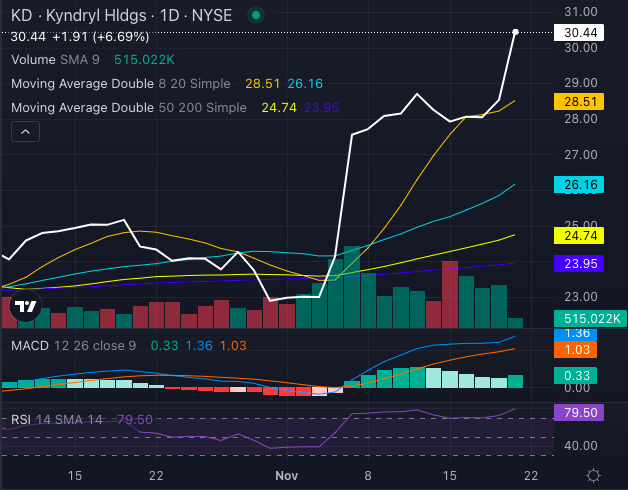Ken Griffin is arguably one of the most successful investors of all time. He made a name for himself when he shorted stocks just ahead of the 1987 market crash that came to be known as “Black Monday.” His profits last year topped $7 billion as his returns of roughly 15% outpaced many of his peers. That result pales in comparison to his performance in 2022, though, when Citadel became “the most successful hedge fund ever,” according to CNN, generating profits of $16 billion, the “largest annual windfall on record.”
Griffin has been outspoken about the potential for generative AI. “This branch of AI will be game-changing for the economy,” he said, “because it will take an enormous amount of work that’s done today by people and do it in a distinctly different, highly automated, highly efficient way.” These weren’t just empty words. At the end of last year, Griffin’s top five individual stock holdings were all AI companies.
It’s therefore worth noting that Griffin has sold more than half his stake in AI stock Broadcom (NASDAQ: AVGO), and is pouring funds into another AI stock-split stock instead.

Image source: Getty Images.
Broadcom has been on fire
Broadcom is one of the gatekeepers in the AI ecosystem. The company provides a wide range of products used in the cable, mobile, broadband, and data center industries. It reports that “99% of all internet traffic crosses through some type of Broadcom technology,” making it a key provider of the tech necessary to facilitate AI.
In its fiscal third quarter, which ended Aug. 4, Broadcom’s revenue grew 47% year over year to $13.1 billion, while its adjusted earnings per share (EPS) increased 18% to $1.24. Management expects its growth streak to continue, and boosted its full-year revenue forecast to $51.5 billion, which would equate to growth of 44%.
Those results help illustrate why Broadcom stock is up 64% over the past year and 188% over the past three years (at the time of this writing). The stock has risen so much, in fact, that management instituted a 10-for-1 stock split that was completed on July 15.
Wall Street is nearly unanimous in its opinion of Broadcom. Of the 42 analysts who cover the stock, 37 rate it a buy or strong buy, and none recommend selling.
That backdrop makes it all the more notable that, during the third quarter, Griffin sold more than 3.1 million shares of Broadcom — roughly 64% of Citadel’s stake in it. He still holds 1.72 million shares worth about $296 million. At the same time, he was buying another AI stock — Nvidia (NASDAQ: NVDA).
Want chips with that?
It’s clear Griffin thought Nvidia represented a compelling opportunity last quarter. The billionaire investor increased Citadel’s stake by more than 7 million shares, an increase of 454%. That brought his total stake to 712 million shares worth $865 million. Among the thousands of stocks in Citadel’s portfolio, Nvidia is the second-largest individual stock holding.
Nvidia has been the poster child for the AI revolution, as its graphics processing units (GPUs) are the most-used hardware for providing the computational horsepower needed to train and run AI models. This has caused a run on the company’s state-of-the-art processors, which have become the gold standard for data centers, where most AI processing takes place.
The unprecedented demand has had an unmistakable impact on Nvidia’s financial results. During its fiscal 2025 third quarter, which ended Oct. 27, Nvidia’s revenue soared 94% year over year to $35 billion, while its adjusted EPS surged 103% to $0.81. Management left no doubt about what drove the results. “The age of AI is in full steam, propelling a global shift to Nvidia computing,” said CEO Jensen Huang.
Those results help explain why Nvidia stock is up 196% over the past year and 342% over the past three years (as of this writing). The company’s unbridled success led management to initiate a 10-for-1 stock split, which was completed on June 10.
Broadcom isn’t the only AI stock-split stock that Wall Street is nearly unanimous about. Of the 64 analysts who have offered an opinion on Nvidia, 60 rate the stock a buy or strong buy, and none recommend selling.
We don’t know exactly when during the third quarter that Griffin added to his stake in Nvidia, but a quick look at the stock chart might provide some insight. In mid-June, rumors about a potential delay in the release of the company’s highly anticipated Blackwell processors sent the stock tumbling, and by early August, Nvidia had shed 27% of its value. Griffin likely saw a bargain he couldn’t resist.
It turns out that Griffin probably didn’t know something that Wall Street doesn’t. He simply saw a compelling opportunity, and he took it. Should retail investors follow his lead now?
Nvidia stock currently trades for 69 times earnings, but that P/E metric doesn’t take into account the company’s above-average growth. Wall Street is predicting Nvidia will generate EPS of $4.36 in its fiscal 2026, which will begin in late January. That gives it a valuation of about 34 times forward earnings. While that’s certainly still a premium price, Nvidia is guiding for year-over-year revenue growth of 70% in the current quarter, with a commensurate uptick in profits, and Wall Street is predicting sales growth of 49% next year.
Given the company’s critical place in the AI revolution and its robust prospects, I am completely convinced that Nvidia stock is still a buy.
Don’t miss this second chance at a potentially lucrative opportunity
Ever feel like you missed the boat in buying the most successful stocks? Then you’ll want to hear this.
On rare occasions, our expert team of analysts issues a “Double Down” stock recommendation for companies that they think are about to pop. If you’re worried you’ve already missed your chance to invest, now is the best time to buy before it’s too late. And the numbers speak for themselves:
- Nvidia: if you invested $1,000 when we doubled down in 2009, you’d have $368,053!*
- Apple: if you invested $1,000 when we doubled down in 2008, you’d have $43,533!*
- Netflix: if you invested $1,000 when we doubled down in 2004, you’d have $484,170!*
Right now, we’re issuing “Double Down” alerts for three incredible companies, and there may not be another chance like this anytime soon.
*Stock Advisor returns as of November 18, 2024
Danny Vena has positions in Nvidia. The Motley Fool has positions in and recommends Nvidia. The Motley Fool recommends Broadcom. The Motley Fool has a disclosure policy.


